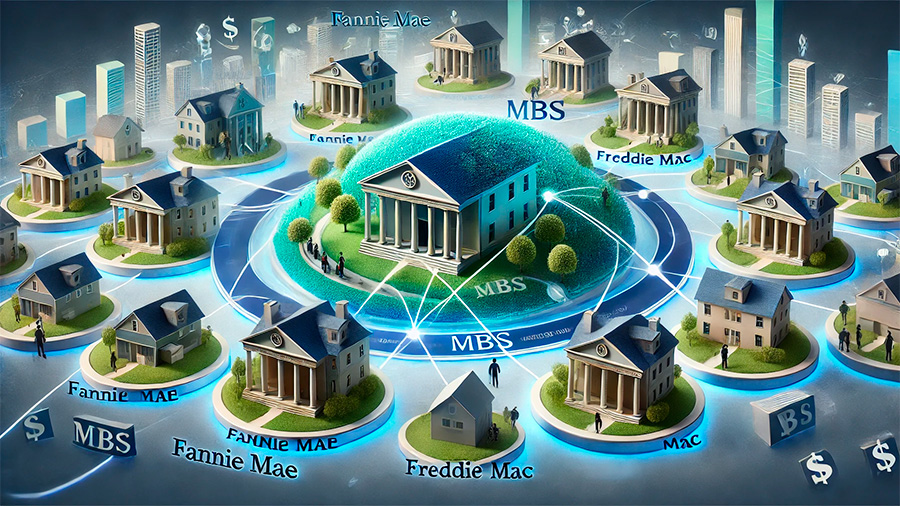
The Impact of Quantitative Easing on the Mortgage-Backed Securities Market
Mortgage-backed securities (MBS) play a crucial role in the modern financial system, offering investors the opportunity to participate in the housing market while providing liquidity to lenders. Government policies, lending practices, and financial incentives have a significant influence on the demand for these securities. By shaping the broader housing market and encouraging lending, government interventions directly impact the supply and attractiveness of mortgage-backed securities for investors.
This article explores how government policy affects the creation and demand for MBS, and how these securities remain a cornerstone of both the housing finance system and the investment landscape.
The Role of Mortgage-Backed Securities in the Financial System
Mortgage-backed securities are a type of financial instrument that pools together home loans and sells them to investors. The payments made by homeowners on their mortgages are passed through to investors in the form of interest and principal, creating a steady income stream. MBS play a key role in the housing market by providing lenders with liquidity, which enables them to issue more loans and, in turn, promotes homeownership.
Government-sponsored entities (GSEs) such as Fannie Mae, Freddie Mac, and Ginnie Mae are instrumental in the creation and support of MBS. These entities purchase mortgages from lenders, package them into securities, and sell them to investors. The involvement of these GSEs, along with government policies aimed at promoting homeownership, directly influences the demand and performance of MBS.
How Government Lending Policies Drive the MBS Market
Government lending policies play a central role in influencing the demand for mortgage-backed securities. By providing support to lenders and borrowers, these policies create a favorable environment for mortgage issuance, which in turn increases the supply of MBS.
1. Government-Backed Loan Programs
Government-backed mortgage loan programs, such as those offered by the Federal Housing Administration (FHA), Veterans Affairs (VA), and the U.S. Department of Agriculture (USDA), significantly impact the MBS market. These programs provide affordable financing options to borrowers who may not qualify for conventional loans, including first-time homebuyers and low-income individuals.
How government-backed loans affect MBS:
- Increased Loan Volume: With more individuals able to qualify for government-backed loans, the volume of mortgages increases, leading to a greater supply of mortgage-backed securities.
- Reduced Risk for Investors: MBS created from government-backed loans carry lower default risks due to the guarantees provided by agencies like Ginnie Mae, which ensures that investors continue receiving payments even if borrowers default.
2. Monetary Policy and Interest Rates
Monetary policy, particularly interest rate decisions made by the Federal Reserve, has a direct impact on the housing market and the demand for MBS. When interest rates are low, borrowing becomes more affordable, leading to increased mortgage issuance. This drives up the supply of MBS as more home loans are packaged into securities for investors.
Conversely, when interest rates rise, the cost of borrowing increases, leading to a slowdown in mortgage origination and a reduced supply of MBS. For investors, changes in interest rates also affect the yield on MBS, influencing their demand in the financial markets.

Incentives and Regulations Shaping the MBS Market
Government incentives and regulations have been introduced over the years to promote homeownership, stabilize the housing market, and ensure the smooth functioning of the MBS market. These policies are designed to provide stability and reduce the risks associated with mortgage lending and investing in MBS.
1. Housing Tax Incentives
Government policies often include tax incentives aimed at promoting homeownership, which indirectly boosts the MBS market. For example, tax deductions on mortgage interest payments encourage more individuals to purchase homes, increasing the demand for mortgages and creating more MBS for investors.
2. Post-2008 Regulatory Changes
Following the 2008 financial crisis, government regulations were introduced to prevent another collapse of the housing market and improve transparency in the MBS market. One of the most significant changes was the introduction of the Dodd-Frank Wall Street Reform and Consumer Protection Act, which aimed to improve lending practices and increase the accountability of financial institutions.
Key regulatory changes impacting MBS:
- Stricter Lending Standards: The introduction of tighter lending standards, including requirements for borrowers to demonstrate the ability to repay their loans, has reduced the risk of default, making MBS more attractive to investors.
- Risk Retention Rules: Lenders are now required to retain a portion of the risk associated with the mortgages they issue, ensuring that they have a vested interest in maintaining high lending standards. This has increased the overall quality of MBS, benefiting investors.
The Impact of Quantitative Easing on MBS Demand
Quantitative easing (QE), a monetary policy tool used by central banks to stimulate the economy, has played a significant role in supporting the MBS market. During periods of economic slowdown or financial instability, central banks, including the Federal Reserve, purchase large quantities of MBS to inject liquidity into the housing market and lower interest rates.
1. Stabilizing the Housing Market
By purchasing MBS, the Federal Reserve helps stabilize the housing market by providing liquidity to lenders and keeping mortgage interest rates low. This encourages borrowing and home purchases, which in turn increases the issuance of new mortgages and supports the supply of MBS.
2. Increasing Demand for MBS
Quantitative easing programs create a steady demand for MBS, as the Federal Reserve becomes a major buyer in the market. This increased demand drives up the price of MBS, benefiting investors by lowering yields and providing a stable source of returns. For the broader financial market, QE supports confidence in the housing finance system and ensures the continued flow of credit to borrowers.

The Role of Government-Sponsored Entities in the MBS Market
Government-sponsored entities (GSEs) like Fannie Mae, Freddie Mac, and Ginnie Mae are central to the functioning of the MBS market. These entities purchase mortgages from lenders, package them into MBS, and sell them to investors. By doing so, they provide liquidity to the housing market, enabling lenders to issue more loans and promote homeownership.
1. Fannie Mae and Freddie Mac
Fannie Mae and Freddie Mac play a crucial role in the conventional mortgage market by purchasing mortgages that meet specific criteria and securitizing them into MBS. These MBS are then sold to investors, allowing lenders to free up capital for additional mortgage lending.
2. Ginnie Mae
Ginnie Mae differs from Fannie Mae and Freddie Mac in that it guarantees the timely payment of principal and interest on MBS backed by government-insured loans, such as those offered by the FHA and VA. This guarantee reduces the risk for investors, making Ginnie Mae-backed MBS highly attractive, especially for risk-averse investors seeking stable returns.
Government Support During Economic Downturns
During economic downturns, government policies often focus on supporting the housing market and preventing a collapse in the mortgage sector. This support includes direct interventions in the MBS market, such as purchasing MBS through quantitative easing or offering financial assistance to homeowners struggling to make mortgage payments.
1. Mortgage Relief Programs
In times of economic crisis, the government may introduce mortgage relief programs that help homeowners avoid foreclosure, such as loan modification programs or mortgage payment deferrals. These programs protect borrowers and stabilize the MBS market by preventing widespread defaults that could lead to significant losses for MBS investors.
2. Emergency Lending Facilities
The Federal Reserve and other government agencies have created emergency lending facilities that purchase MBS from financial institutions during periods of economic instability. By providing liquidity to the MBS market, these facilities help maintain investor confidence and ensure the continued functioning of the mortgage finance system.
Conclusion
Government policies, lending practices, and financial incentives play a significant role in shaping the mortgage-backed securities market. From promoting homeownership through government-backed loans to implementing regulations that reduce risk, these interventions directly impact the supply and demand for MBS. Investors, in turn, benefit from the stability provided by government-sponsored entities and central bank interventions, making MBS a critical component of the financial system and a popular choice for risk-averse investors.
As government policies continue to evolve, particularly in response to economic crises or shifts in the housing market, the mortgage-backed securities market will remain closely tied to these interventions, shaping both the housing finance system and investment opportunities for years to come.
Calendar
| M | T | W | T | F | S | S |
|---|---|---|---|---|---|---|
| 1 | 2 | 3 | 4 | 5 | ||
| 6 | 7 | 8 | 9 | 10 | 11 | 12 |
| 13 | 14 | 15 | 16 | 17 | 18 | 19 |
| 20 | 21 | 22 | 23 | 24 | 25 | 26 |
| 27 | 28 | 29 | 30 | 31 | ||
